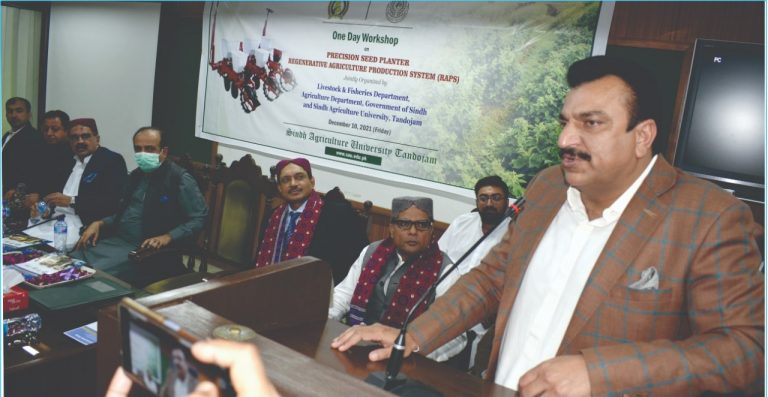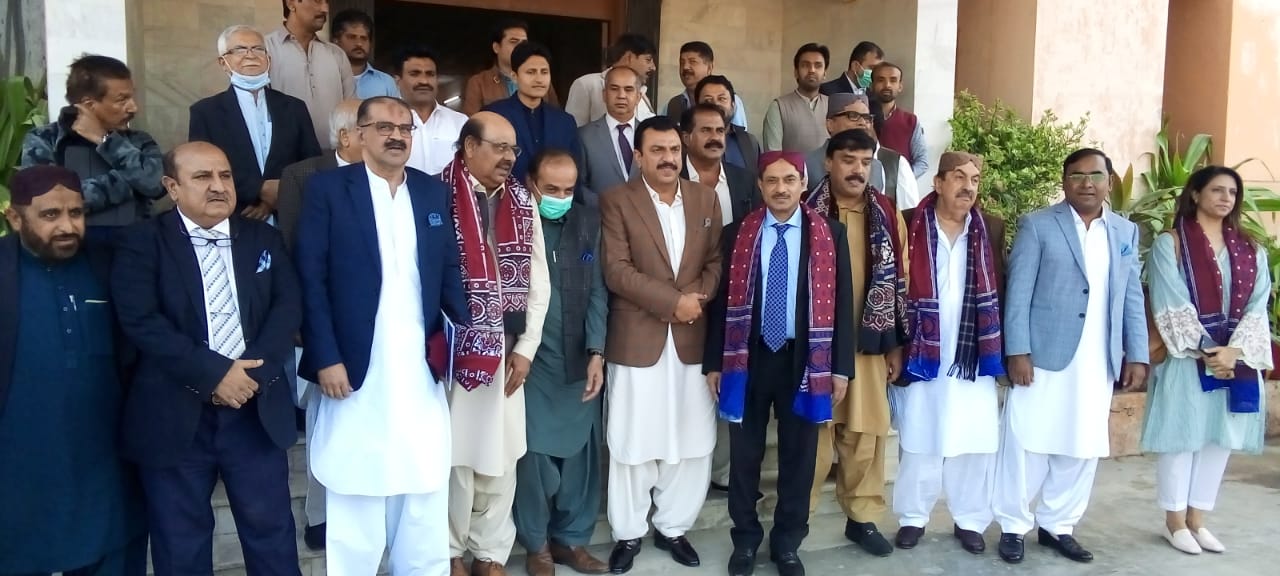
Mental and physical weakness is on the rise in Sindh, especially among women and children, due to malnutrition – VC SAU Dr. Marri
Tando Jam
In view of declining share of agriculture sector in Pakistan’s GDP, the progressive farmers, experts and technocrats from various federal and provincial departments and representatives of various agricultural organizations emphasized the need of using modern machinery, certified seeds and environmental-friendly farming methods to improve productivity and save natural resources of this sector.
“This will help alleviate the malnutrition in children and adolescents, which poses serious risks for the future,” they said speaking at a workshop on “Regenerative agriculture production system (RAPS)” organized in collaboration with Livestock and Fisheries Department at Senate Hall, Sindh Agriculture University Tando Jam on Friday. An awareness seminar on prevention of malnutrition in children and families through natural food was also held.
 Addressing the workshop and seminar, Sindh Minister for Livestock and Fisheries Engineer Abdul Bari Pitafi said that despite no investment in agriculture sector for the last 72 years, it still contributes more than industry to the country’s GDP.
Addressing the workshop and seminar, Sindh Minister for Livestock and Fisheries Engineer Abdul Bari Pitafi said that despite no investment in agriculture sector for the last 72 years, it still contributes more than industry to the country’s GDP.
He said that the health sector of the province has a budget of Rs.250 billion while the livestock department has a budget of only Rs.6.5 billion. “Due to lack of required attention and investment in agriculture, its share in GDP has come down from 53% to 21%,” minister told.
Dr. Fateh Marri, Vice Chancellor, Sindh Agriculture University, said that mental and physical weakness is on the rise in Sindh, especially among women and children, due to malnutrition, therefore, the use of dairy and agricultural products and improved ecosystem will provide better manpower to the country to the future generations. He added that resettlement of arid and saline lands and improvement of soil fertility will solve many agricultural problems.
Hamid Jaleel, member Planning Commission Pakistan said, “We are destroying the natural system by existing methods of cultivation. We are eliminating underground fertility, soil moisture and carbon by blowing it into the air, killing beneficial bacteria and soil by all means.”
Dr. Nazir Hussain Kalhoro, Director General Livestock said that malnutrition has created a dangerous situation which will prevent 50% of the youth from getting jobs and business in the next 20 years. He said that at present the rate of youth in the country is 64% and due to malnutrition the rate will reduce to 27% after 20 years.
Agriculture Expert from Punjab Asif Sharif said through online speech that the country’s agriculture is going through a critical period. “The future of agriculture is declining due to growing population and lack of understanding of agricultural farming conditions.”
Syed Mehmood Nawaz Shah, Vice President Sindh Aabadgar Board said that modern agriculture can give better results.
Syed Miran Mohammad Shah, Chairman Chamber of Agriculture said, “We are experimenting in different ways, but institutions must address issues related to agriculture on a priority basis.”
 Shabnam Baloch, Provincial Leader, International Trade Center (GRASP), said that value chain and livestock by-products should be given priority in agriculture. She said that agriculture in the world is run by the private sector, so now it has to be understood as an industry.
Shabnam Baloch, Provincial Leader, International Trade Center (GRASP), said that value chain and livestock by-products should be given priority in agriculture. She said that agriculture in the world is run by the private sector, so now it has to be understood as an industry.
Dr. Muhammad Ismail Kambhar, Dr. Abdullah Sethar and others spoke on the occasion. Director General Agriculture Research Noor Muhammad Baloch, Progressive Dr. Zulfiqar Yousafani, Zahid Bhurgri, Syed Zarar Haider, Syed Noor Muhammad Shah, Nabi Bakhsh Sathio, Karim Talpur, Sharif Nizamani, Agha Zafarullah Durrani, Commander Atif and other progressive farmers, Agriculture Experts, personalities from different fields participated. (PR)
__________________